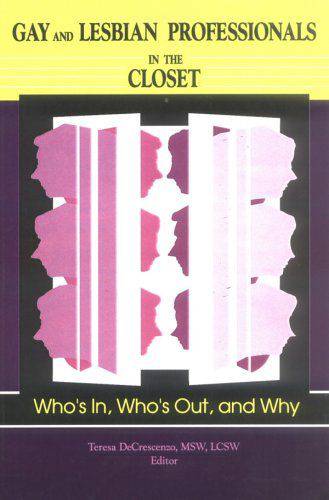Gay and Lesbian Professionals in the Closet
Who’s In, Who’s Out, and Why
Teresa DeCrescenzo
The closet takes its toll on its dwellers through their experiences of isolation, fear, paranoia, potentially increased internalized homophobia, and dissonance between role and identity; yet many people in the helping professions do not feel that it is desirable or even appropriate to disclose their sexual orientation to those receiving help. Gay and Lesbian Professionals in the Closet explores the different positions people take on this provocative issue, the arguments they use to support their positions, and why the issue may not be as clear-cut as it sometimes seems.While complex sociopsychological factors, cultural values and influences, and legal issues keep many gays, lesbians, and bisexuals in the closet, closeted practice may have its advantages. A closeted practitioner, whether case manager, counselor, psychotherapist, physician, or minister, can bring understanding and insight to practice with homosexual clients and their families, as well as lend substantial support to openly gay and lesbian helping professionals. Yet, as Gay and Lesbian Professionals in the Closet reveals, being closeted can compromise your integrity, as well as that of your clients, and the benefits of being out will likely outweigh those of being closeted. Being out will help readers: counteract stereotypes of gays and lesbians allow you to serve as a role model improve the quality of care offered by traditionally homophobic, or homo-ignorant, institutions and employees contribute to the establishment of affirming services and environments for both yourself and your clients stop segregating your sexual life from the rest of your life attain credibility with your clients not feed repression through silenceAs Gay and Lesbian Professionals in the Closet will show readers, it is always important to consider patients’needs and each work setting before coming out, but gay, lesbian, and bisexual social service providers should make decisions on a case-by-case basis, not avoid being out altogether. Being open in the workplace will remind caregivers, clients, and coworkers of the exemplary citizenship and service gays, lesbians, and bisexuals are capable of offering. Think again whether the closet carries protective cover from discrimination or tacit endorsement of homophobia.
Check for it on:
Details
| ISBN | 9780789003317 |
| Genre | LGBT Studies/Social Sciences |
| Copyright Date | 1997 |
| Publication Date | 02-Oct-97 |
| Publisher | Haworth Press |
| Editor | Teresa DeCrescenzo |
| Format | Hardcover |
| No. of Pages | 122 |
| Language | English |
| Rating | NotRated |
| Editor | Teresa DeCrescenzo |
| Subject | Gay Human Services Personnel – United States |
| BookID | 4514 |
